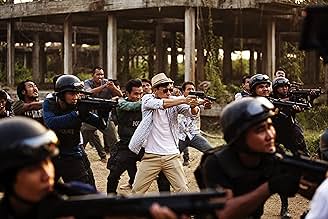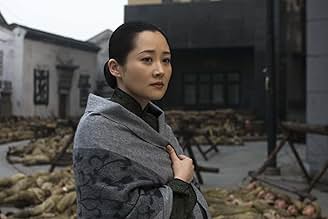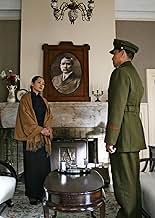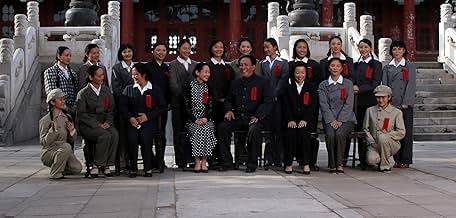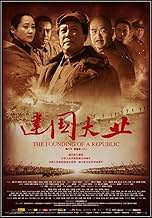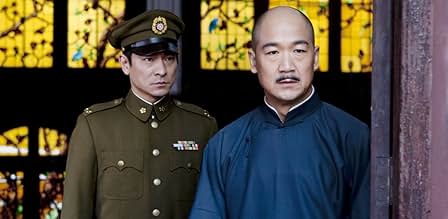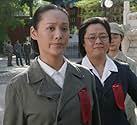Jian guo da ye
- 2009
- 2h 18min
La fundación de una república teje la apasionante historia de un hombre que luchó contra la tiranía de un gobernante.La fundación de una república teje la apasionante historia de un hombre que luchó contra la tiranía de un gobernante.La fundación de una república teje la apasionante historia de un hombre que luchó contra la tiranía de un gobernante.
- Dirección
- Guión
- Reparto principal
- Premios
- 15 premios y 7 nominaciones en total
Reseñas destacadas
Ignore this completely!! For one thing Jet Li and Jackie Chan have extremely small cameos which combined last around 2 minutes TOPS!! Their parts in this are not even worth mentioning.
There are 1 or 2 shots (at the most) that are anything like "breath-taking", one of these consisted of a shot that was in sepia style which was similar (but had unfortunately less impact) to the beach scene in Saving Private Ryan (including the extreme wide panning shots). The editing and many of the shots seem amateur making some parts seem comical, which is a shame as many of the actors seem very talented and don't deserve to be represented as poorly as they are in some of the scenes.
The "explosive action sequences" consists of a few explosions (one man has his foot blown off) and no action.
If you are interested in the history of China then this is a film for you, as I would suggest it is a good representation of the events. And the actors who ARE in the film are very good. For educational purposes, this film succeeds.
But if you read the cover in the UK then choose to buy thinking you will be getting 2 and a half hours of epic battles then you have been fooled. Instead prepare yourself for a very long, unwitty docu-drama. There are epic battles but unfortunately they are only political ones.
Using Jackie Chan and Jet Li to sell this is practically fraud.
The movie objective is to talk about the foundation of PRC and the film does well, have great actors, its good in their proposal. If you want to see costumes, behaviour of that times see the movie.
* Mao Zedong is portrayed as almost childish at times and as leaving most of the work to Zhou Enlai and others. In fact, he worked hard on a mountain of issues.
* Areas where Mao worked hard were the military campaigns (with Zhu De) and land reform in the newly liberated areas. Yet the movie gives most of its time to maneuvering among the "democratic parties" of the capitalists and intellectuals; the CPC; and the KMT. We hardly see peasants.
These faults in this 2009 movie are a result of Deng Xiaoping's turn to capitalism, reversing the socialist line of Mao Zedong.
(I posted these remarks as a comment on the Youtube page for the movie. They disappeared overnight. Whenever it can, the Chinese government uses the same instant-censorship apparatus around the world that it uses within its borders.)
The acting is perfect. It's a star studded cast. They got all the biggest Chinese stars to do this. And you can tell. Both Jackie Chan and Jet Li have minor supporting roles. Their stars aren't bright enough to crowd out the better talent. So that's saying a lot. Great dialogue, as well. Anyway, cool to see a film like this where USA is the villain. While I'm in no way pro-Chinese. I do like variety and shifts in perspective.
There's zero soul searching going on in this film. In this film Mao is the best guy ever. Truly loved and respected by all who know him. Although Chiang Kai Shek didn't actually kick a dog on screen... you just knew he did off camera. This is a bad man.
I'm a history buff. So I've read biographies about all these people. They didn't need to do it this way. The Chinese communist party (ou tin the real world) already declared Mao an incompetent leader, and purged all his "henchmen". They did that in the 70'ies. So there should be zero contemporary controversy, in China, to do an accurate portrayal of both Chiang Kai Shek and Mao. But they chose to do it this way instead. Which took me a bit out of the drama. It's fun when the American ambassador is shown as a coward who doesn't stick up for his friends. Again... just nice to see, for a change, a high quality film that doesn't endlessly repeat the Hollywood messages of America's perfection.
They do a quite good job dramatising, what essentially just is, a series of talks where a bunch of elderly men negotiate at various tables. There is a lot of smoking, and talking about smoking. I never figured out the symbolism of that. Or perhaps it just was historically accurate? The film does get a bit boring at times. There's a fun segment where Mao has taken sleeping pills but needs to get to safety in a bomb shelter. But he's high as a kite from the pills, and has no intention of cooperating with his handlers, who end up having to carry him by force on a stretcher (not a spoiler, since everybody who knows anything about history knows Mao survived).
They do show some of the fighting. But this isn't a war movie. This film is only about the, behind the scenes, negotiating that later led to what became the formation of the republic. It spends a lot of time explaining why and how each member of the first Central Committee was elected. Which might be more fun if I knew more about recent Chinese history. Most of these names mean nothing to me. But it's pretty clear the viewers are supposed to be impressed. Which is another thing I like about it. Just like American propaganda films, it's shot for a domestic audience. It's obvious that this is shot for a Chinese audience, and only a Chinese audience. So they don't bother explaining, lots of stuff, you just have to know. I've read a lot of history, so I could mostly follow it. But far from everything. I did a lot of pausing and looking up stuff on Wikipedia. I must admit that I liked that aspect of it. It adds to the immersion, somehow. Despite it's flaws I did learn a lot, which I think is what's most important when it comes to historical dramas.
This film downplays the theme of "ideological struggle" that saturates previous films about the founding of the PRC in place of a dramatized struggle of power between different historical personalities. An extensive list of Chinese entertainment celebrities (from Jet Li to Donny Yen) make 2 minute cameos to portray an equally extensive list of notable Chinese political celebrities from that time period. It's as if someone thought it would be a good idea to adapt the formula for the "Romance of the Three Kingdoms" to the story of the PRC's founding-- except it's not nearly as romantic or interesting.
The film portrays Chang Kai Shak as a conscientious political leader unable to contain the corruption of the KMT and compelled to make choices that dashed any real possibility of a multi-party democratic government in post-WWII China. The filmmakers show him struggling with KMT party members who seek to usurp his presidency and attempting to fight war-profiteering backed by political nepotism, all the while minimizing the actual scope of the corruption in order to market the film to a Taiwanese audience that is probably even more critical of Chang's historical role in this dark chapter of "Chinese history." Meanwhile, Mao is his usual mythologized self--a caring leader, a humble revolutionary, a loving father, a forgiving man, a light-hearted philosopher, and perhaps even a psychic. In one dialogue, Mao is seen emphasizing the need to get help from the "petty bourgeoisie" to rebuild China's war-devastated economy as if predicting (and giving his blessings to) the current free market reforms that began decades later with Deng Xiao Ping.
This is not a film for serious historians and enthusiasts, unless you are looking for an over-budgeted bad comedy. In fact, it's not that different from previous PRC films on the same subject. It's just updated with newer techniques of storytelling for contemporary Chinese film audiences that works in a more subtle way to legitimate the party's current vision of the PRC state. Thus, propaganda version 2.0.
¿Sabías que...?
- CuriosidadesThis movie was made to coincide with the 60th Anniversary of the Chinese Communist Party founding of China. This movie boasts the most number of China's movie stars in one movie. Many of the top stars were invited to star as leads, supporting characters, or just cameo in the movie, reportedly including some of the top Chinese stars like Jackie Chan and Jet Li, who only have one shot or one line in the movie.
- Citas
Li Ji-chen: I heard you intend to resign. Even if you were to resign, at least wait till after the capitulation ceremony in Nanjing. You helped defeat the Japanese. The ceremony can't do without a national hero like you.
Chen Shaokuan: If I don't resign, very soon I'll be blamed for the civil war. We fought against the country's enemy for 8 years. We've struggled, we've fought all, nothing more need be said. And now that we've won, we're still warring. Against whom ? Chinese people fighting Chinese people... this kind of job, I do not want.
Selecciones populares
- How long is The Founding of a Republic?Con tecnología de Alexa
Detalles
- Fecha de lanzamiento
- Países de origen
- Idiomas
- Títulos en diferentes países
- The Founding of a Republic
- Localizaciones del rodaje
- Empresas productoras
- Ver más compañías en los créditos en IMDbPro
Taquilla
- Recaudación en todo el mundo
- 1.035.741 US$
- Duración2 horas 18 minutos
- Color
- Mezcla de sonido
- Relación de aspecto
- 2.35 : 1

